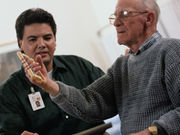Baseline frailty didn’t modify effect of physical activity on reducing major mobility disability
TUESDAY, Jan. 9, 2018 (HealthDay News) — A long-term physical activity program is not associated with reduced risk of frailty among community-dwelling older adults with functional limitations, according to a study published online Jan. 9 in the Annals of Internal Medicine.
Andrea Trombetti, M.D., from Geneva University Hospitals, and colleagues examined whether a long-term structured physical activity program is associated with reduced risk of frailty in a multicenter trial involving 1,635 community-dwelling adults aged 70 to 89 years with functional limitations. The intervention comprised a structured, moderate-intensity physical activity program that included aerobic, resistance, and flexibility activities.
The researchers found that the risk of frailty was not statistically significantly different in the physical activity versus the health education group over 24 months of follow-up (adjusted prevalence difference, −0.021; 95 percent confidence interval, −0.049 to 0.007). The physical activity intervention correlated with improvement in the inability to rise from a chair among the criteria of the Study of Osteoporotic Fractures index (−0.050; 95 percent confidence interval, −0.081 to −0.020). The effect of physical activity on reducing incident major mobility disability was not modified by baseline frailty status (P for interaction = 0.91).
“A structured, moderate-intensity physical activity program was not associated with a reduced risk for frailty over two years among sedentary, community-dwelling older adults,” the authors write.
Two authors disclosed financial ties to the pharmaceutical, biotechnology, and nutrition industries.
Copyright © 2018 HealthDay. All rights reserved.








